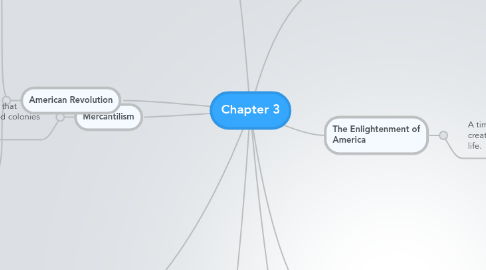
1. From Resistance to Revolution
1.1. Coercive Acts 1774, threatened the economic health and political freedom of Massachusetts, but the assemblies were already proposing to defend their rights in the First Continental Congress in Philadelphia 1775, they organized the Continental Association to enforce all boycotts on british goods.
2. Taxation or tyranny
2.1. The British Leaders centralized imperial authority at the expense of colonial autonomy.
3. Mercantilism
3.1. The English mercantilism believed that prosperity depended on power and colonies contributing to national wealth.
4. The Great Awakening
4.1. Religious revival in American History, imposed by George Whitfield
5. American Revolution
5.1. Due to ineffective resolution of post war problems.
5.1.1. The Sugar Act
5.1.1.1. George Greenville's solution on colonist compelled with colonial administration, was to tax major imported goods. But the colonies saw the tax as a threat to their rights as English subjects cannot be taxed without their consent.
5.1.2. The Stamp Act; The pot set to boiling
5.1.2.1. Exercised tax on printed matter, The sons of liberty organized extralegal organized resistance leading to the revolution.
5.2. Control and power
5.2.1. The declaratory Act
5.2.1.1. A statement of Parliament authority and colonial subordination.
5.2.2. The townshed Dutie
5.2.2.1. Charles Townshed creates more regulations, he claimed that the colonist would agreed on having direct and indirect taxation on the imported goods. Moreover he imposed an extraordinary penalty for smugglers.
5.2.2.2. the community stated to boycott by issuing Circular Letters asserting the unconstitutiionality of the parliament agreed by Samuel Adams, the british sent troops to boston as a result.
5.2.3. The Boston Massacre 1770
5.2.3.1. British troops causing disturbance and killing 5 colonist.
5.2.4. The Pot spills over
5.2.4.1. Colonist broke the truce by burning a british customs ship in 1772. The British believed on the colonist as being lawless and therefore created a inter-colonial resistance.
5.2.5. The Tea Act Crisis
5.2.5.1. The Tea Act Crisis, was the British attempt to bargain Tea prices to the British Colonies in America, this action was seen as obscene to them as it was against their principals, as a result they would threw the tea from a boston harbor.
6. The British Colonial System
6.1. While the British Empire was in charge of the colonies, due to the distance and the british political inefficiency, the colonies still posessed sufficient local power.
6.2. Colonies had appointed governor, council and judges.
6.3. Royal officials were restricted and merely influenced by the local assembly.
6.4. Decisions and Acts were never mainly proposed by the british government, they barely disagreed on the assemblies.
7. The Navigation Act
7.1. Forced the colonies into using British transportation system in order for the colonies to just trade with England and ceased to trade with other European Countries.
7.2. Creating higher prices for manufactured imports in the colonies.
7.3. The colonies were still prosperous for the weak enforcement of laws, smuggling and bribery were common.
8. The Enlightenment of America
8.1. A time where people believed in God as a creator but not as an intrusive force in ordinary life.
9. Repercussions of Distant Wars
9.1. Mainly wars created an economic inflation on the colonies.
9.2. The Great War for the Empire:
9.2.1. The french and the indian war, was a war between the french and the british to possess the land in the Ohio Valley, the british troops outnumbered and therefore the british possesed the lands on motreal and quebec by 1760.
9.2.2. The british empire had almost cleared all the states, for the exception of new orleans among other territories to the west, but the war repercussions were that people expressed more loyalty to the king and the mother country.
9.2.3. Burden of an expanded empire
9.2.3.1. Due to the wars, england faced huge national debt which wasn't adequately controlled by King George III
